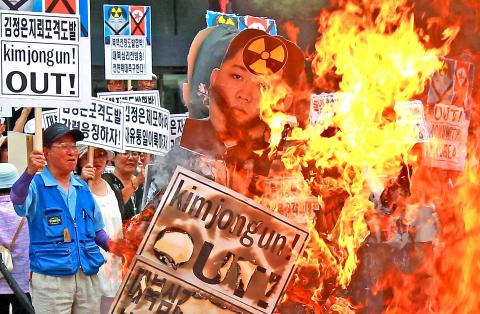North Korean leader Kim Jong-un yesterday declared his frontline troops are in a “quasi-state of war” and ordered them to prepare for battle a day after the most serious confrontation between the rivals in years.
South Korea’s military on Thursday fired dozens of artillery rounds across the border in response to what Seoul said were North Korean artillery strikes meant to back up a threat to attack loudspeakers broadcasting anti-Pyongyang propaganda.
North Korea’s declaration yesterday is similar to its other warlike rhetoric in recent years, including repeated threats to reduce Seoul to a “sea of fire,” and the huge numbers of soldiers and military equipment already stationed along the border mean the area is always essentially in a “quasi-state of war.”

Photo: EPA
Still, North Korea’s apparent willingness to test Seoul with military strikes and its recent warning of further action has raised concern because South Korea has vowed to hit back with overwhelming strength should North Korea attack again.
Pyongyang said it did not fire anything at South Korea, a claim Seoul dismissed as nonsense.
Kim ordered his troops to “enter a wartime state” and be fully ready for any military operations starting yesterday evening, according to a report by Pyongyang’s official Korean Central News Agency. North Korea has also given Seoul a deadline of today to remove border loudspeakers that, after a lull of 11 years, have started broadcasting anti-Pyongyang propaganda.
Failure would result in military action, Pyongyang said, but Seoul has vowed to continue the broadcasts.
A North Korean media report said that “military commanders were urgently dispatched for operations to attack South Korean psychological warfare facilities if the South does not stop operating them.”
South Korea’s Yonhap news agency, citing an unidentified government source, yesterday reported that South Korean and US surveillance assets detected the movement of vehicles carrying short-range Scud and medium-range Rodong missiles in a possible preparation for launches. The South Korean Ministry of National Defense said it could not confirm the report.
North Korea said South Korean shells fired on Thursday landed near four military posts, but caused no injuries. No one was reported injured in South Korea, either, although hundreds were evacuated from frontline towns.
The loudspeaker broadcasts began after South Korea accused North Korea of planting land mines that maimed two South Korean soldiers earlier this month, which Pyongyang denies.
North Korea on Thursday afternoon first fired a single round believed to be from an anti-aircraft gun, which landed near a South Korean border town, Seoul said. About 20 minutes later, three North Korean artillery shells fell on the southern side of the Demilitarized Zone dividing the two nations. South Korea responded with dozens of 155mm artillery rounds, according to South Korean defense officials.
South Korea’s military yesterday said that North Korea must refrain from engaging in “rash acts” or face strong punishment, according to South Korea’s Defense Ministry. South Korea raised its military readiness to its highest level. South Korean Joint Chiefs of Staff spokesman Jeon Ha-kyu told a televised news conference that South Korea is ready to repel any additional provocation.

SECURITY: As China is ‘reshaping’ Hong Kong’s population, Taiwan must raise the eligibility threshold for applications from Hong Kongers, Chiu Chui-cheng said When Hong Kong and Macau citizens apply for residency in Taiwan, it would be under a new category that includes a “national security observation period,” Mainland Affairs Council (MAC) Minister Chiu Chui-cheng (邱垂正) said yesterday. President William Lai (賴清德) on March 13 announced 17 strategies to counter China’s aggression toward Taiwan, including incorporating national security considerations into the review process for residency applications from Hong Kong and Macau citizens. The situation in Hong Kong is constantly changing, Chiu said to media yesterday on the sidelines of the Taipei Technology Run hosted by the Taipei Neihu Technology Park Development Association. With

CARROT AND STICK: While unrelenting in its military threats, China attracted nearly 40,000 Taiwanese to over 400 business events last year Nearly 40,000 Taiwanese last year joined industry events in China, such as conferences and trade fairs, supported by the Chinese government, a study showed yesterday, as Beijing ramps up a charm offensive toward Taipei alongside military pressure. China has long taken a carrot-and-stick approach to Taiwan, threatening it with the prospect of military action while reaching out to those it believes are amenable to Beijing’s point of view. Taiwanese security officials are wary of what they see as Beijing’s influence campaigns to sway public opinion after Taipei and Beijing gradually resumed travel links halted by the COVID-19 pandemic, but the scale of

A US Marine Corps regiment equipped with Naval Strike Missiles (NSM) is set to participate in the upcoming Balikatan 25 exercise in the Luzon Strait, marking the system’s first-ever deployment in the Philippines. US and Philippine officials have separately confirmed that the Navy Marine Expeditionary Ship Interdiction System (NMESIS) — the mobile launch platform for the Naval Strike Missile — would take part in the joint exercise. The missiles are being deployed to “a strategic first island chain chokepoint” in the waters between Taiwan proper and the Philippines, US-based Naval News reported. “The Luzon Strait and Bashi Channel represent a critical access

Pope Francis is be laid to rest on Saturday after lying in state for three days in St Peter’s Basilica, where the faithful are expected to flock to pay their respects to history’s first Latin American pontiff. The cardinals met yesterday in the Vatican’s synod hall to chart the next steps before a conclave begins to choose Francis’ successor, as condolences poured in from around the world. According to current norms, the conclave must begin between May 5 and 10. The cardinals set the funeral for Saturday at 10am in St Peter’s Square, to be celebrated by the dean of the College